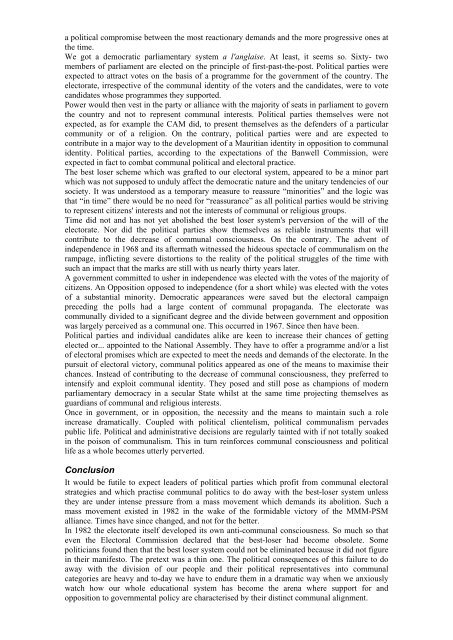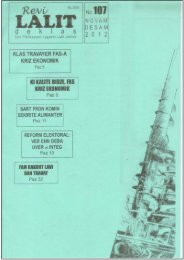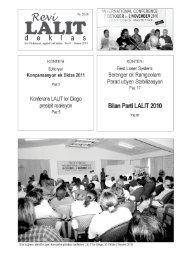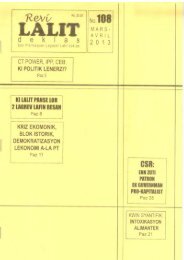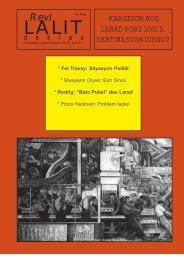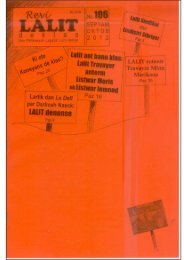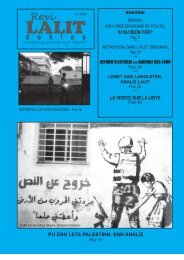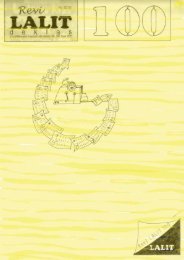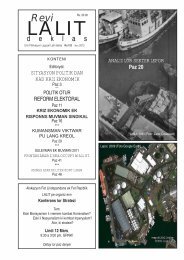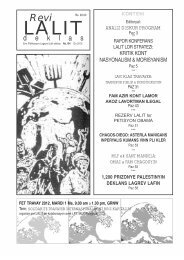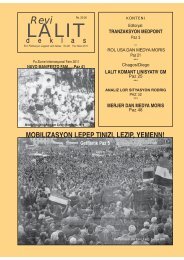Against communalism of the best-loser system - Lalit Mauritius
Against communalism of the best-loser system - Lalit Mauritius
Against communalism of the best-loser system - Lalit Mauritius
You also want an ePaper? Increase the reach of your titles
YUMPU automatically turns print PDFs into web optimized ePapers that Google loves.
a political compromise between <strong>the</strong> most reactionary demands and <strong>the</strong> more progressive ones at<br />
<strong>the</strong> time.<br />
We got a democratic parliamentary <strong>system</strong> a l'anglaise. At least, it seems so. Sixty- two<br />
members <strong>of</strong> parliament are elected on <strong>the</strong> principle <strong>of</strong> first-past-<strong>the</strong>-post. Political parties were<br />
expected to attract votes on <strong>the</strong> basis <strong>of</strong> a programme for <strong>the</strong> government <strong>of</strong> <strong>the</strong> country. The<br />
electorate, irrespective <strong>of</strong> <strong>the</strong> communal identity <strong>of</strong> <strong>the</strong> voters and <strong>the</strong> candidates, were to vote<br />
candidates whose programmes <strong>the</strong>y supported.<br />
Power would <strong>the</strong>n vest in <strong>the</strong> party or alliance with <strong>the</strong> majority <strong>of</strong> seats in parliament to govern<br />
<strong>the</strong> country and not to represent communal interests. Political parties <strong>the</strong>mselves were not<br />
expected, as for example <strong>the</strong> CAM did, to present <strong>the</strong>mselves as <strong>the</strong> defenders <strong>of</strong> a particular<br />
community or <strong>of</strong> a religion. On <strong>the</strong> contrary, political parties were and are expected to<br />
contribute in a major way to <strong>the</strong> development <strong>of</strong> a Mauritian identity in opposition to communal<br />
identity. Political parties, according to <strong>the</strong> expectations <strong>of</strong> <strong>the</strong> Banwell Commission, were<br />
expected in fact to combat communal political and electoral practice.<br />
The <strong>best</strong> <strong>loser</strong> scheme which was grafted to our electoral <strong>system</strong>, appeared to be a minor part<br />
which was not supposed to unduly affect <strong>the</strong> democratic nature and <strong>the</strong> unitary tendencies <strong>of</strong> our<br />
society. It was understood as a temporary measure to reassure “minorities” and <strong>the</strong> logic was<br />
that “in time” <strong>the</strong>re would be no need for “reassurance” as all political parties would be striving<br />
to represent citizens' interests and not <strong>the</strong> interests <strong>of</strong> communal or religious groups.<br />
Time did not and has not yet abolished <strong>the</strong> <strong>best</strong> <strong>loser</strong> <strong>system</strong>'s perversion <strong>of</strong> <strong>the</strong> will <strong>of</strong> <strong>the</strong><br />
electorate. Nor did <strong>the</strong> political parties show <strong>the</strong>mselves as reliable instruments that will<br />
contribute to <strong>the</strong> decrease <strong>of</strong> communal consciousness. On <strong>the</strong> contrary. The advent <strong>of</strong><br />
independence in 1968 and its aftermath witnessed <strong>the</strong> hideous spectacle <strong>of</strong> <strong>communalism</strong> on <strong>the</strong><br />
rampage, inflicting severe distortions to <strong>the</strong> reality <strong>of</strong> <strong>the</strong> political struggles <strong>of</strong> <strong>the</strong> time with<br />
such an impact that <strong>the</strong> marks are still with us nearly thirty years later.<br />
A government committed to usher in independence was elected with <strong>the</strong> votes <strong>of</strong> <strong>the</strong> majority <strong>of</strong><br />
citizens. An Opposition opposed to independence (for a short while) was elected with <strong>the</strong> votes<br />
<strong>of</strong> a substantial minority. Democratic appearances were saved but <strong>the</strong> electoral campaign<br />
preceding <strong>the</strong> polls had a large content <strong>of</strong> communal propaganda. The electorate was<br />
communally divided to a significant degree and <strong>the</strong> divide between government and opposition<br />
was largely perceived as a communal one. This occurred in 1967. Since <strong>the</strong>n have been.<br />
Political parties and individual candidates alike are keen to increase <strong>the</strong>ir chances <strong>of</strong> getting<br />
elected or... appointed to <strong>the</strong> National Assembly. They have to <strong>of</strong>fer a programme and/or a list<br />
<strong>of</strong> electoral promises which are expected to meet <strong>the</strong> needs and demands <strong>of</strong> <strong>the</strong> electorate. In <strong>the</strong><br />
pursuit <strong>of</strong> electoral victory, communal politics appeared as one <strong>of</strong> <strong>the</strong> means to maximise <strong>the</strong>ir<br />
chances. Instead <strong>of</strong> contributing to <strong>the</strong> decrease <strong>of</strong> communal consciousness, <strong>the</strong>y preferred to<br />
intensify and exploit communal identity. They posed and still pose as champions <strong>of</strong> modern<br />
parliamentary democracy in a secular State whilst at <strong>the</strong> same time projecting <strong>the</strong>mselves as<br />
guardians <strong>of</strong> communal and religious interests.<br />
Once in government, or in opposition, <strong>the</strong> necessity and <strong>the</strong> means to maintain such a role<br />
increase dramatically. Coupled with political clientelism, political <strong>communalism</strong> pervades<br />
public life. Political and administrative decisions are regularly tainted with if not totally soaked<br />
in <strong>the</strong> poison <strong>of</strong> <strong>communalism</strong>. This in turn reinforces communal consciousness and political<br />
life as a whole becomes utterly perverted.<br />
Conclusion<br />
It would be futile to expect leaders <strong>of</strong> political parties which pr<strong>of</strong>it from communal electoral<br />
strategies and which practise communal politics to do away with <strong>the</strong> <strong>best</strong>-<strong>loser</strong> <strong>system</strong> unless<br />
<strong>the</strong>y are under intense pressure from a mass movement which demands its abolition. Such a<br />
mass movement existed in 1982 in <strong>the</strong> wake <strong>of</strong> <strong>the</strong> formidable victory <strong>of</strong> <strong>the</strong> MMM-PSM<br />
alliance. Times have since changed, and not for <strong>the</strong> better.<br />
In 1982 <strong>the</strong> electorate itself developed its own anti-communal consciousness. So much so that<br />
even <strong>the</strong> Electoral Commission declared that <strong>the</strong> <strong>best</strong>-<strong>loser</strong> had become obsolete. Some<br />
politicians found <strong>the</strong>n that <strong>the</strong> <strong>best</strong> <strong>loser</strong> <strong>system</strong> could not be eliminated because it did not figure<br />
in <strong>the</strong>ir manifesto. The pretext was a thin one. The political consequences <strong>of</strong> this failure to do<br />
away with <strong>the</strong> division <strong>of</strong> our people and <strong>the</strong>ir political representatives into communal<br />
categories are heavy and to-day we have to endure <strong>the</strong>m in a dramatic way when we anxiously<br />
watch how our whole educational <strong>system</strong> has become <strong>the</strong> arena where support for and<br />
opposition to governmental policy are characterised by <strong>the</strong>ir distinct communal alignment.


